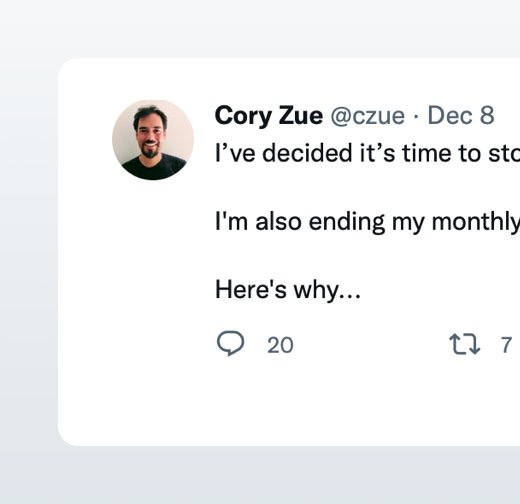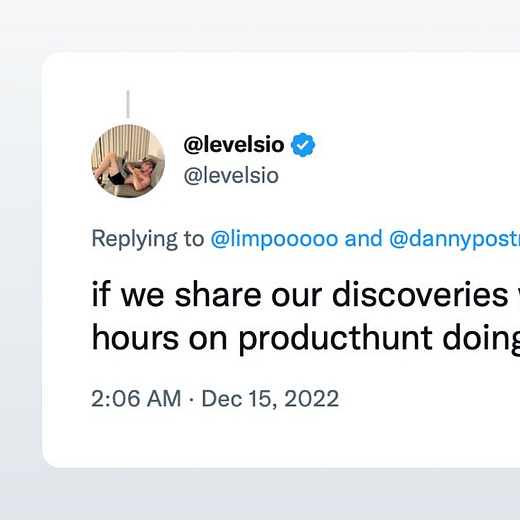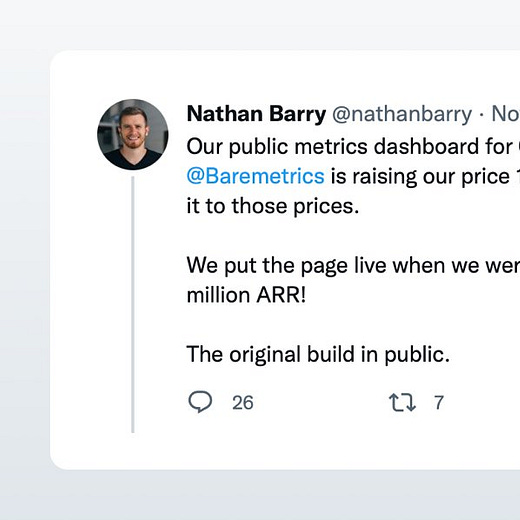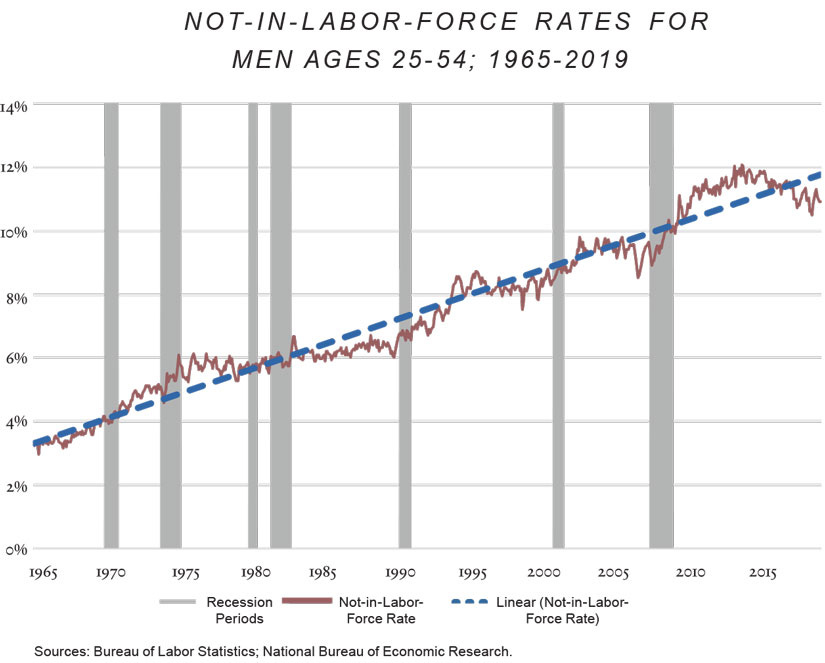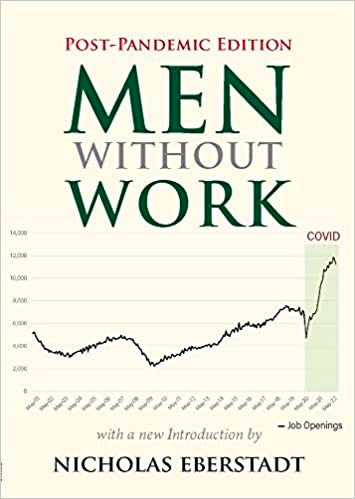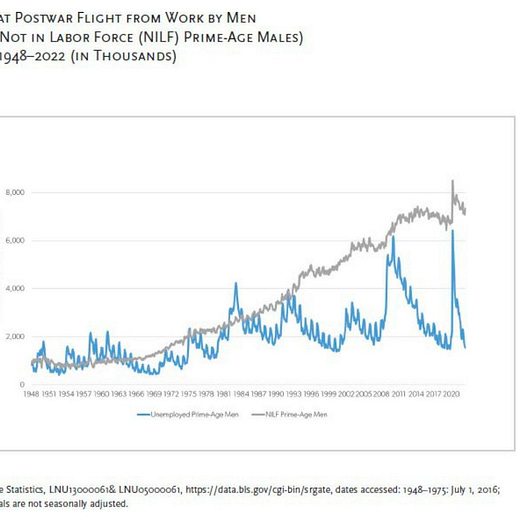The Long Game 135: Diet & Identity, The Internet Wants to Be Fragmented, Building in Public, Remembering
🗣 Commenting vs. making, The Middle Class is Dead, Conditioning, Men Without Work, Rucking, and Much More!
Hi there, it’s Mehdi Yacoubi, co-founder at Vital, and this is The Long Game Newsletter. To receive it in your inbox each week, subscribe here:
I’m a big fan of Twitter, but if you’re looking for a more peaceful & healthier social network, you can join us on Vital.
In this episode, we explore:
Don’t associate your identity with your diet
The internet wants to be fragmented
We are what we remember
Building in public
Let’s dive in!
🥑 Health
🌊 Don’t Associate Your Identity with Your Diet
We have already touched on this idea multiple times, but I thought a reminder would be beneficial.
A lot of people adopt an identity related to their eating habits. Be it fasting, veganism, keto, or carnivore, you name it!
It’s very tempting because we’re tribal creatures by nature, and we like to form groups, but I think we should resist this as much as possible.
The problem (and sometimes benefit) with identity is that it’s hard to change it. In the context of diets, science evolves, new facts emerge, and new ways of measuring how foods impact your body are constantly being developed.
So there’s close to zero chance your current diet will be the optimal diet for you in 10—20 years.
Strong convictions, loosely held.
From The Long Game 120:
It’s not new that most of what we think and do comes from our identity or the identity of the person we aspire to become. This leads to polarization in society because people stop thinking rationally about things and approach everything through the lens of their identity, and downstream of that, you get a culture war. Unfortunately, health & wellness isn’t spared.
For example:
Keto, low carb, lifting, cold exposure, sauna, meat, and supplements seem to be one political & cultural side.
Veganism, vegetarianism, running, cardio, triathlon, and meditation seem to be another political & cultural side.
These are just examples, and you’ll, of course, find a lot of counter-examples, but I think it’s fair to characterize the two buckets of practices like this.
It’s unfortunate because if there were one thing that could bring people together, it would really be health & wellness practices.
This article gives a funny perspective on exercising and social classes:
“I'm really into lifting weights right now,” I said. “Trying to get strong.”
The lawyer’s wife, a marathoner and family therapist, appeared startled, as if concerned about my emotional state. She looked me in the eye and said, “Why?”
Sociologists, it turns out, have studied these covert athletic biases. Carl Stempel, for example, writing in the International Review for the Sociology of Sport, argues that upper middle class Americans avoid “excessive displays of strength,” viewing the bodybuilder look as vulgar overcompensation for wounded manhood. The so-called dominant classes, Stempel writes—especially those like my friends and myself, richer in fancy degrees than in actual dollars—tend to express dominance through strenuous aerobic sports that display moral character, self-control, and self-development, rather than physical dominance. By chasing pure strength, in other words, packing on all that muscle, I had violated the unspoken prejudices—and dearly held self-definitions—of my social group.
Everything is about signaling—unfortunately(?)!
🌱 Wellness
🔀 The Internet Wants to Be Fragmented
I couldn’t find a tweet I saw a few months ago, but it was saying something along the lines of “the world wasn’t ready to have everyone plunged on the same social platforms, people with different values, different principles, we were never ready to constantly be exposed to some things and ideas that are so radically different from ours.” It wasn’t so much about banning such ideas; it’s just that things might actually be way better if people weren’t constantly exposed to people they vehemently disagree with.
There is this idea that being confronted with opposing views is healthy and necessary, and I agree with it to an extent. We also see the limits of that with how fragmented society became after central social networks were the de facto public square for society.
Noahpinion has a great piece about why the internet should go back to being fragmented:
In place of centralized social media we see a few things rising. First, there’s TikTok and YouTube; although these do have some comment features, overall they’re far more similar to television, radio, and traditional one-way push media, with content driven by algorithms instead of user sharing. Second, Snapchat and Instagram, which are geared much more toward personal interactions and less toward public discussions. And though they weren’t included in the survey, my general sense from both anecdotes and overall usage trends is that chat apps — WhatsApp, Signal, Discord, etc. — are becoming more popular.
What these rising apps and platforms all share is fragmentation. Whether it’s intentional self-sorting into like-minded or community-moderated groups, or the natural fragmentation that comes from a bunch of different people watching their own algorithmically curated video feeds, these apps all have a way of separating people based on who they want to talk to and what they want to be exposed to.
This is how we restore the old internet — not in its original form, but in its glorious, fragmented essence. People call Twitter an indispensable public space because it’s the “town square”, but in the real world there isn’t just one town square, because there isn’t just one town. There are many. And the internet works when you can exit — when you can move to a different town if you don’t like the mayor or the local culture. This doesn’t mean we need a world where nobody talks to anyone we disagree with — instead of thick walls, we need semipermeable membranes. And a fragmented internet, where people can try out multiple spaces and move from forum to forum, is perfect for providing those membranes. Disagreement in society is necessary for progress, but it’s most constructive when it’s mediated by bonds of trust and affinity and semi-privacy. Our boundaries will always rub up against each other, but we need some boundaries.
Perhaps someday the human race will be ready to become one collective consciousness. But the experiment of the 2010s shows that this day is not today. Let the internet once more be an escape — a place where you can find your people and be happy. Let us learn to speak a thousand different languages once again. Let the Tower of Babel fall.
🧠 Better Thinking
🧠 We Are What We Remember
Memory is an intrinsic part of our life experience. It is critical for learning, and without memories we would have no sense of self. Understanding why some memories stick better than others, as well as accepting their fluidity, helps us reduce conflict and better appreciate just how much our memories impact our lives.
Memories can be so vivid. Let’s say you are spending time with your sibling and reflecting on your past when suddenly a memory pops up. Even though it’s about events that occurred twenty years ago, it seems like it happened yesterday. The sounds and smells pop into your mind. You remember what you were wearing, the color of the flowers on the table. You chuckle and share your memory with your sibling. But they stare at you and say, “That’s not how I remember it at all.” What?
Memory discrepancies happen all the time, but we have a hard time accepting that our memories are rarely accurate. Because we’ve been conditioned to think of our memories like video recordings or data stored in the cloud, we assert that our rememberings are the correct ones. Anyone who remembers the situation differently must be wrong.
A cool side effect of writing The Long Game is that it helps me remember much better all the stuff I read, listen to or watch.
⚡️ Startup Stuff
🚫 Building in Public
I think it’s safe to say the days of building in public are over. It doesn’t mean the days of engaging your community to develop your product are over. Still, the extreme transparency that came with building in public was responsible for many problems.
This piece explains why:
Building in public has been good to me. My audience—small though it is—has been a consistent source of support. They cheer me on, give me ideas, occasionally buy or help promote my products, and a handful have even turned into real-life friends. It’s unclear that I’d be nearly as successful if I’d done this whole thing privately.
And it’s helped me. My retrospective process has helped me stay accountable to…myself—something that isn’t always easy when you’re working alone.
And so it is with some reluctance that I’ve decided it’s time to stop.
Not entirely, but I’ll no longer be sharing my revenue publicly, will no longer publish monthly retrospectives, and generally will go from being “radically transparent” to something more like “thoughtfully transparent”.
The main reasons are:
It feels like bragging
Fending off competitors and copycats
Pair with: Building in Public Versus Dropping Like a Thunderbolt: Which Marketing Strategy is Best?
📚 What I Read
👋 The Middle Class Is Dead. Long Live the Long Tail Class.
A networked, creative economy cannot produce a normal distribution of income. Our focus should shift to providing a minimum-viable lifestyle to a growing long-tail class. Cities have a critical role to play in that process.
Economists and policymakers aspire to bring back the 20th Century. They seek a world with a broad middle class where standardized education produces standardized employees who fit into clearly-structured organizations and produce linear output through consistent effort.
But the 20th Century is never coming back. A networked economy cannot produce a middle class. A creative economy does not reward standardized skills. Linear input is no longer sufficient to produce valuable output.
A growing number of professions are becoming scalable. From software engineers to fitness instructors, a small minority can service a large group of customers. Even in occupations where time remains a constraint, having a global reach means matching with the people who are willing to pay the most for your services at any given moment.
But the winners in such a world are not at peace. They rely on the network for their livelihood, leaving them at the whims of crowds, algorithms, and complex dynamics that no one can predict or control.
The economy is becoming a lottery. Chance events play a growing role in determining the winners, and the winners are becoming bigger than ever. Instead of a "Middle Class" of near-average earners, we are moving to a world characterized by a "Long-Tail Class" where most people earn much less than the average.
🔨 When Extreme Necessity is the Mother of Invention
Evidence from three global crises:
Crises show us that we are capable of rapidly responding to new exigencies with new solutions. But precisely because crises call for solutions urgently, those living in them do not have the luxury of waiting for fundamental science to advance and then make possible perfect solutions. Because crises force us to use the knowledge at hand, it is important to enter crises with a deep well of knowledge.
🗣 Commenting vs. making
Vastly different activities.
This type of casual drive-by advice is astonishingly common. I’ve mostly learned to ignore it when received. I do still love to provide it. It’s well-meaning, and you get to feel smart without actually needing to do any work.
I’ve come to believe that working through something is the only way to explore the idea maze. Everything else is commentary. I’ve mostly stopped sharing unsolicited “helpful” just-a-thoughts and comments at work. I save them for Twitter, the primordial soup of commentary from which living things occasionally emerge.
Now, when I get the urge to comment, I try to be on the maker’s side and ask,
“So, what are we going to do about it?”
🍭 Brain Food
📉 The Decline of Men in the Workforce
I thought this interview with Nicholas Eberstadt, author of Men Without Work, was fascinating and alarming.
Nicholas Eberstadt: Sure. What economists call prime working age men. It's pretty self-explanatory, guys 25 to 54 are still the backbone of the economy and they have a tiny non-economic role in life also in raising families, raising children. Up until the 1960s, work rates for prime age men in America were consistent and very high. And then starting in the mid 60s, something changed. And since about 1965, we have seen a relentless and almost (inaudible), consistent retreat from the workforce for those men. Today, the work rate for prime age men is lower than it was in early 1940, which is the only really good measurement we have for The Great Depression, comes from the census of that year. At that time, the unemployment level for America was almost 15%, but work rates today are lower than they were for American men that age back in 1940. So we've got kind of a Great Depression scale work problem for men on our hands in the US right now.
Gerry Baker: As you point out in the book, this is not in large part, what we could call involuntary unemployment. A lot of this is voluntary removal from the workforce. I mean, should be careful about our terms, because I know we're going to talk to you about what exactly is driving it. But again, it's important to remember this is not captured in the unemployment figures. This is captured in the broader data that we have about the labor force. So millions of men who would, if we'd had sort of employment participation at the rates that we'd had in the 1960s, what's happened to them? Where have they gone? I mean, is it ... Some of them, presumably longer education, some of it is to do with disability. Give us the factors that have contributed to this remarkable decline.
Nicholas Eberstadt: No, you put your finger on it. The difference between the Depression era and now is that if you didn't have a job back in 1940, it was because you were looking for one and you couldn't find it. If you are a guy who doesn't have work today, the odds are it's because you've dropped out of the workforce all together. You're neither working nor looking for work. For every prime age guy who's unemployed, there are over four who are neither working nor looking for work. We have this unworking army of over 7 million prime age men in the United States today.
🎥 What I’m Watching
💪 A Case For Conditioning
I used to watch Brian six years ago, and I’m very happy his channel popped up on my feed last week. What a well of knowledge he is. I also really like the Strongman-type of training. Unfortunately, I don’t have access to strongman implements, but I hope I will in the future.
Still, you’ll find many ideas to get stronger & have a better work capacity.
Pair with: 9 ROW Variations to BUILD a Thicker, Stronger Back!
📈 The Rise of Single & Childless Women
Pair with: Rise of the SHEconomy & The Crushing Loneliness of the Girl Boss
🔧 The Tool of the Week
🎒 Rucksacks
One of the things I want to do more next year is rucking. I don’t have a rucksack and will most likely use my regular gym backpack as it’s already super heavy with the chains, bands, squat shoes, etc., but if you want to invest in a rucksack, these look great.
🪐 Quote I’m Pondering
“I don’t stop when I’m tired, I stop when I’m done.”
– David Goggins
👋 EndNote
Thanks for reading!
If you like The Long Game, please share it on social media or forward this email to someone who might enjoy it. You can also “like” this newsletter by clicking the ❤️ just below, which helps me get visibility on Substack.
Until next week,
Mehdi Yacoubi



